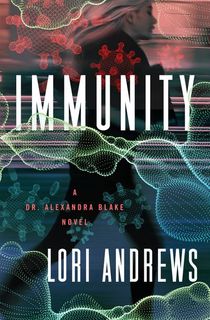As a policy advisor on genetics and law, I field mind-bending calls with some regularity. Scientists, policy wonks, and high-ranking government officials from around the globe ask me for advice on genetics policy: If I clone a Neanderthal, what rights would that clone have? Can I put the genes to photosynthesize in human embryos so the resulting children wouldn’t need food, but could get their energy from the sun like plants? Should a gene related to criminality allow someone to get off a murder charge similar to the insanity defense because he couldn’t help himself? If a DNA test reveals that a 15-year-old girl’s biological father was her mother’s long-ago lover, should joint custody be given to the dad she’s never met?
Sure, I can quote existing chapter and verse about what the laws say, but for many genetic breakthroughs, there’s no law to cover it. So I give my callers some surprising advice: Read a mystery.
Related: 11 Heart-Pounding Medical Thriller Books for Patricia Cornwell Fans
That’s right. Almost any genetic quandary that a policymaker can think of has already been explored by a mystery author in his or her written work. These works of fiction provide guidance to policymakers because novelists investigate how genetics impact individuals, relationships, communities, and social institutions.
In fact, works of fiction, from bleeding-edge medical mysteries to sci-fi classics and beyond, are regularly referenced throughout the policy-making process. In dealing with embryo stem cell issues, President George W. Bush quoted Aldous Huxley’s Brave New World. When I testified before Congress about genetics and reproduction, a member of Congress cited Margaret Atwood’s The Handmaid’s Tale. Why do these narratives carry such resonance? I believe part of it has to do with where scientists and authors overlap—and where they diverge.
Related: Celebrating the Female Mystery Writers Who Craft Our Favorite Thrilling Reads
Scientists concentrate on the impact of their actions in the field of science and medicine, while most novelists imagine how a genetic bag of tricks might play out in a world of relationships, financial inequality, dogmatic leaders, and family dynamics. Scott Turow was one of the first novelists to incorporate forensic DNA testing into a novel in Presumed Innocent. His more recent medical mystery, Identical, confronts the limits of DNA testing when the accused offender has an identical twin. In reality, heinous crimes committed by an identical twin have gone unpunished because the existence of the other twin makes it impossible to prove guilt “beyond a reasonable doubt.”
A Gripping New Medical Mystery by Lori Andrews:

Immunity
Dr. Alex Blake traces the rise of a deadly new pandemic in a thrilling medical mystery “as timely as today’s headlines” from the author of The Silent Assassin (SeattlePI.com).
Any genetic technology used today is fair game for a mystery. In Robin Cook’s Genesis, a young medical examiner harnesses DNA from an ancestry website in search of a killer. And in Ken Follett’s The Third Twin, medical research at an in vitro fertilization clinic plays a surprising role in tracking down a criminal.
Even Shakespeare’s plays ruminate on the inheritance of behavior, nature versus nurture when twins are separated at birth, and the question of whether physical deformities and psychological aberrations are linked. Scientists have named particular mutations after Shakespeare’s characters. Malvolio (named for Twelfth Night’s party pooper) is the mutation that makes you dislike the taste of sugar. Hamlet is the name of a mutation in IIB progenitor cells (“to be or not to be…”). The Capulet gene, a nod to Juliet Capulet in Romeo and Juliet, causes cells to die in a dramatic way.
Related: 12 Thrilling Mystery Novels with Badass Female Protagonists
My job as a policy advisor takes me behind closed doors in laboratories and biotech companies, where money and lives are at stake. It’s led me to the White House (to advise on cloning and on embryo stem cells), to the U.S. Supreme Court (where we successfully changed the policy so that companies couldn’t own our genes), to advising companies, consumer groups, and governments around the world.
Lori Andrews Reads from Immunity
With what I’ve seen, how could I not want to write medical mysteries? And by having a geneticist, Dr. Alexandra Blake, as my main character, I have a ready set of conflicts involving family, morality, greed, and why we behave the way we do. I can create situations in which my main character is expected to use her talents in ways that she objects to morally. My plot lines can relate to the latest issues in science and culture, from genetic privacy to cutting-edge forensics, from genetic discrimination in the workplace to the recent decision in Italy to dig up 49 members of the Medici family to use biological science techniques to determine who had murdered whom.
And, if I run out of ideas, I can just pick up the phone the next time a scientist or government official calls me.
Check out Lori Andrews' latest medical mystery featuring Dr. Alexandra Blake:

Immunity
“Andrews, a real-life authority on genetics, spikes the chills with a talking DNA computer named Sam and insights into hot-button Native American issues... [in her] exciting third helix-twister to feature Dr. Alex Blake of the Armed Forces Institute of Pathology” —Publishers Weekly
Watch Lori Andrews' author Q&A on Facebook Live
Lori Andrews is the former chair of the federal advisory committee to the Human Genome Project. She is the author of the Dr. Alexandra Blake mystery series. In the latest, Immunity, Dr. Blake faces a pandemic during a presidential election. Learn more at www.immunityanovel.com
